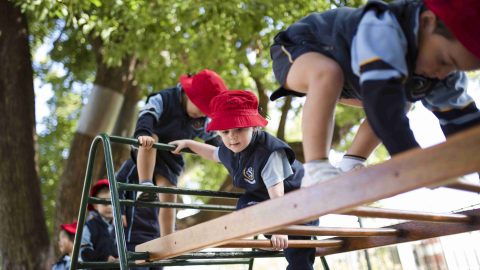Campbell House News

Playing in the Campbell House Grounds
The completed area of the Campbell House playground was a joy to experience on the first day of Term. All our young learners excitedly explored and maximised every learning opportunity now available! To observe their excitement was indeed thrilling! Stage 2 of the project should be completed in November.
Well set up, well designed and well managed, the outdoor play spaces offer maximum opportunities for investigation, exploration, problem solving, imagining, creating and enjoying. The Reggio Emilia approach emphasises the necessity for children to explore and learn both indoors and outdoors. Children love and benefit from the opportunity to explore and play with natural materials.
The Reggio Emilia approach highly values the elements of light, transparency and exposure to natural materials. In the Campbell House playground, learners are offered various spaces which invite children to run, jump, move and play, or to sit and gather to chat and imagine with their peers. Problem solving and meeting challenges are major aspects of the outdoor play opportunities in Campbell House.
Playing amongst trees, plants, sand, water and other natural elements promotes curiosity, imagination and inquiry. Conversations between children as they enjoy being outdoors together, are rich with enthusiasm and interest, and observers are privileged to see, and hear, the links being made between play and learning.
Why Children Play
Four times per year Early Childhood Australia publishes documentation which is called The Research and Practice Series. It contains current work in areas of Early Learning.
An in-depth investigation into why children play, and the importance of play is fascinating. We take for granted, perhaps, that children play however, an article in The Research and Practice Series lists the reasons why they do. We have listed them below for discussion and interest.
Children play because they:
- Enjoy the experience and draw deep emotional satisfaction and contentment from it
- Love the feeling of linking information from prior experiences and gaining further understandings whilst playing
- Love developing and mastering/practising new skills
- Use it to assist them to make sense of things
- Find that, through play, they can make/maintain friendships
- Can exercise a certain amount of freedom and control, as distinct from the times in which adults are directly demanding certain things to be done, or the way in which to do them.
Play has an essential contribution to make towards the building of important skills. Confidence, competence and independence are essential characteristics and are well fostered through play.


